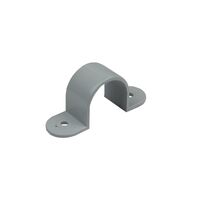Kingsgrove Branch:
25mm Conduit

G'day! If you've ever had a squiz at a wiring job, you'll know that standard grey 20mm conduit. It's the fair dinkum workhorse for running a power point or a light circuit. But what happens when you need to run some serious power? A big, grunty cable for a sub-main to the shed, or for a massive new air conditioner?
Trying to squeeze a big, fat cable down that skinny 20mm pipe is like trying to put on your old footy shorts after Christmas lunch. It's just not going to happen. That's when a professional tradie reaches for the bigger brother: the mighty 25mm conduit.
So, What is 25mm Conduit, Exactly?
A 25mm conduit is simply a rigid, protective electrical pipe with a 25mm diameter. Like its smaller 20mm cousin, its one and only job is to be a tough-as-nails bodyguard for the electrical cables run inside, protecting them from impacts, moisture, and the harsh Aussie sun.
It's the next size up, and it's the go-to for any job that's a bit more heavy-duty than a standard power point.
Why Go for 25mm? (The 'Bigger is Better' Argument)
So why would a licensed electrician choose 25mm conduit over the standard 20mm? It all comes down to space and grunt.
- It's for Bigger, Fatter Cables: This is the main reason. When you're running a high-power circuit – like a 'sub-main' to feed a whole new switchboard in a granny flat or shed – you're using a much thicker, gruntier cable (like 6mm², 10mm², or even 16mm²). These simply will not fit in a 20mm pipe.
- Running Multiple Cables: What if you need to run a power circuit and a lighting circuit to the shed in the same pipe? Chucking two or three standard cables into a 20mm pipe is a nightmare to pull through. A 25mm pipe gives you the extra room to run multiple circuits easily.
- Easier to Pull (Less Hard Yakka): Every tradie knows that pulling cables can be hard yakka. More space in the pipe means less friction, which makes pulling the cables through (especially on a long run with a few bends) a hell of a lot easier.
- Future-Proofing, Mate! This is the mark of a smart installer. Even if you're only running one cable to the shed now, a good tradie will often install a 25mm conduit. Why? Because it leaves you room to easily pull another circuit through later on without having to dig a new trench or run a whole new pipe. It's a top-notch bit of forward-thinking.
Where You'll See It Used
- Sub-Mains: The number one use. Feeding power to sheds, workshops, pool pumps, and granny flats.
- Dedicated High-Power Circuits: Running power for a big, grunty split system air conditioner, a large electric cooktop, or an instant hot water system.
- Commercial Fit-outs: It's a very common size in light commercial jobs for running power and data.
The CRITICAL Safety Warning: This is NOT a DIY Job!
Righto, let's get dead serious for a sec. You, as a DIYer, can walk into any hardware store and buy a length of 25mm conduit and a few fittings. That's fine. You can even mount the empty conduit on your shed wall or bury it in a trench (as long as you follow the depth rules!).
But the absolute second you need to pull the 240V or 415V electrical cables through it and connect them, you MUST STOP.
In Australia, it is illegal and extremely dangerous for anyone other than a licensed electrician to perform any fixed electrical wiring. A simple mistake can lead to a fatal electric shock or a house fire, and it will void your home insurance in a heartbeat. Don't be a galah – it's just not worth the risk.
A Professional Job Needs Professional Gear
When a licensed electrician turns up to run that new sub-main to your shed, they're going to do the job right with trade-quality gear. They won't be using flimsy, non-compliant conduit or dodgy fittings. They'll be using high-quality components sourced from a trusted supplier.
As one of Australia's most electrical wholesaler and suppliers, Schnap Electric Products stocks the lot for the professional installer. They've got a massive range of heavy-duty, UV-stabilised 25mm conduit, plus all the compliant fittings a qualified professional needs – from the sweeping bends and couplings to the glands and weatherproof boxes. And, of course, they supply all the top-grade 6mm, 10mm, and 16mm electrical cable to run inside it. For a job that's safe, compliant, and built to last, the pros rely on a supplier like Schnap Electric.
Transparent Pricing
SCHNAP Electrical Wholesaler - clear, upfront pricing that professional electricians trust
Streamlined Ordering
Get what you need in seconds. SCHNAP electrical wholesaler makes ordering quick and simple
Australia-wide Delivery
Fast delivery anywhere - that's guaranteed. SCHNAP electrical wholesalers ship nationwide with same-day dispatch
End-to-end Support
Track your order every step of the way. SCHNAP electrical wholesale keeps you updated from click to delivery

Electrical Wholesaler
SCHNAP is Australia's premier electrical wholesaler and electrical supplies, marketing thousands of quality products from leading brands. Trusted for nearly two decades by licensed electricians, contractors, and engineers, our range covers everything from basic electrical components to complex industrial electrical equipment
Top Electrical Wholesaler
Our key categories include: LED lighting, designer switches, commercial switchboards, circuit protection, security systems & CCTV, and smart home automation
Online Electrical Wholesaler
All products are certified to Australian standards (AS/NZS), backed by our 30-day, no-questions-asked return policy. Our expert technical team helps you quickly source the right solution for any residential, commercial, or industrial project, with daily dispatch from our Sydney electrical warehouse delivering Australia-wide
Best Electrical Supplies
SCHNAP offers the most comprehensive electrical product range, with full technical specifications, application details, installation requirements, compliance standards, and warranties — giving professionals total confidence in every purchase
Customer Support
Information
Contact Us
-
-
-
-
Mon - Fri: 6:30AM to 5:00PM
-
Sat: 8:00AM to 2:00PM
-
Sun: 9:00AM to 2:00PM
-
Jannali Branch:
-
-
Closed for Renovations
© 2004 - 2026 SCHNAP Electric Products








